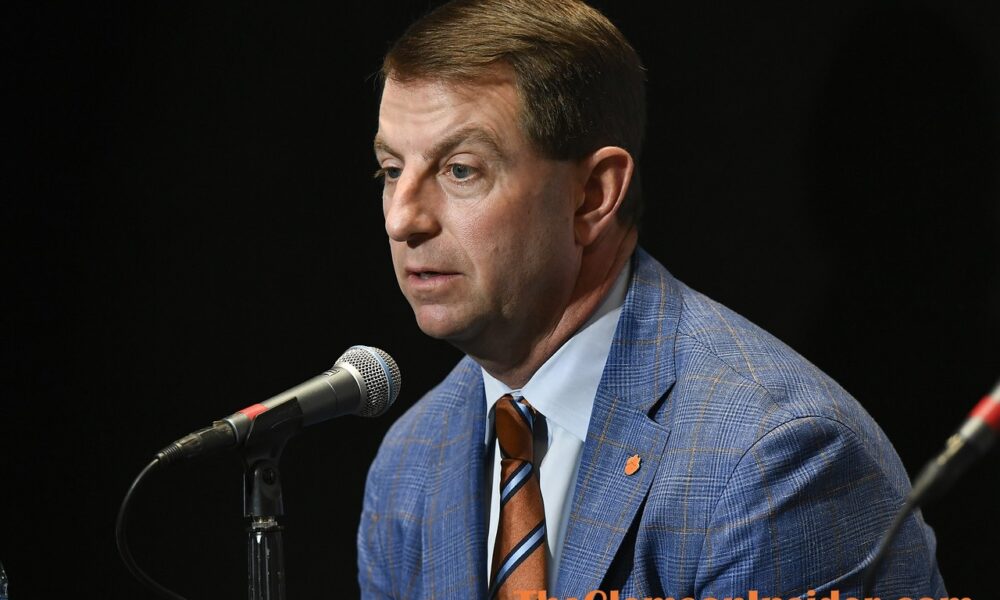CLEMSON — The South Carolina House of Representatives’ Education and Public Works Committee reported favorably to bill 4957 with a 14-3 vote Tuesday at the South Carolina Statehouse in Columbia, S.C.
The bill is to amend the South Carolina Code of Laws by amending sections, relating to definitions concerning intercollegiate athletes’ compensation for their Name, Image and Likeness (NIL). If passed, schools such as Clemson, South Carolina and Coastal Carolina will be able to bring their collectives in house to work with their athletic departments.
What that means for Clemson is the athletic department and IPTAY, through the 110 Society, will be allowed to identify potential NIL opportunities for student-athletes and even facilitate deals between student-athletes and third parties.
“We have resources in all areas of the student-athlete experience,” Clemson head football coach Dabo Swinney said to the committee. “We have academic resources. We have nutrition resources. We have strength and condition resources. Obviously, we have football teaching resources.
“But we have been limited in our NIL involvement through the ever-changing-guidance of the NCAA. That has left our student-athletes trying to figure much of this out on their own, navigating complex NIL opportunities without trained guidance and direction for those who are eager to assist them.”
Swinney was one of several coaches from Clemson, South Carolina and Coastal Carolina that was in Columbia to lobby for bill 4957. Clemson head men’s soccer head coach Mike Noonan and athletic director Graham Neff also spoke to the committee.
“We believe it is vital for the state of South Carolina to lead the way in providing our institutions the opportunity to fully serve our student athletes in the NIL space by facilitating deals and providing protections against bad actors and helping them maximize their NIL opportunities in the short window that they have as student athletes,” Swinney said.
Neff later explained the bad actors Swinney was talking about were representatives (agents) and others who were not necessarily helping the student-athletes in good faith. He mentioned some of the student athletes representative were hiding future representation rights within the documents that were not negotiated with the student athletes.
South Carolina head football coach Shane Beamer and athletic director Ray Tanner spoke to the committee as well, while Coastal Carolina had head football coach Tim Beck, women’s basketball coach Kevin Pederson and athletic director Matt Hogue on hand.
South Carolina head women’s basketball coach Dawn Staley did not speak at the public hearing, but she did speak and visit with the Education and Public Works Committee earlier in the day.
“This law will give us stability, flexibility and allow the institutions that we work at to make decisions, and all also provide protection from an ever-changing climate,” Beamer said.
Now that the bill has been reported favorably by the committee, it will go before the whole House at a later date. Should it get passed by the House, it will then go the Senate, and if everything goes well, and it does not have to go back to committee, it will go to the Governor to sign it into law.
The Governor can still veto the bill, but that is unlikely to happen.
Noonan represented Clemson’s equivalency sports. The two-time national championship coach wanted to express why this law is so important to his sport, as well as baseball, softball and others.
He expressed how only 9.9 scholarships are distributed to his 31 student-athletes. Most of his players are receiving 25 percent or less scholarship money. Clemson baseball, softball and women’s soccer have the same issues.
“I can only think of the positive impact that we can have on our student-athletes, while freeing some of the financial constraints placed on them by opening doors both athletically and academically through the passing of this legislation.”
Everyone involved is hopeful the new legislation will be passed sometime this summer.
“NIL is complex. There are a lot of misconceptions about what it is and who it benefits,” Neff said. “Right now, the most visible student-athletes have the most value in the marketplace. This system currently relies on them or their representative to pursue and make informed decisions on key legal and financial opportunities, while limiting the role of which the universities are to assist and support in these manners.
“With the changes we are seeking with this legislation, schools would be more involved in support of our student-athletes and that can materialize in a number of different ways.”
Neff outlined an example of how the NCAA has deregulated collectives, leading to them jeopardizing a player’s eligibility and institutional status.
“This legislation will allow us to advise and perhaps help a student make a more informed decision on this important critical matter and opportunity.”
Get your signed Valerie Cagle replica road sign today. The nation’s top player has signed a limited number of these signs that have the same properties as a road sign.

